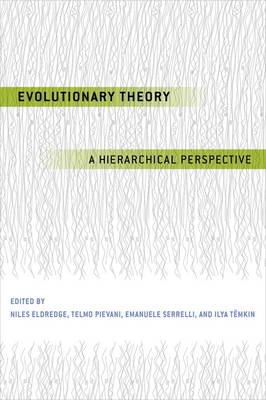The editors of Evolutionary Theory are all respected scholars with important track records as advocates of an understanding of evolution that does not conform to the standard, received version the so-called Evolutionary or Modern Synthesis. The central point of disagreement between the two camps turns on the role of natural selection: while neither denies its role, the editors of and...
Read moreThe editors of Evolutionary Theory are all respected scholars with important track records as advocates of an understanding of evolution that does not conform to the standard, received version the so-called Evolutionary or Modern Synthesis. The central point of disagreement between the two camps turns on the role of natural selection: while neither denies its role, the editors of and contributors to this volume consider that it is not the only factor that plays a role in speciation especially the origin of species. Clear and readable, chapters explore themes of information, integration, organization, mereology, context, time and the constraints responsible for bringing hierarchies into being and keeping them in existence while allowing them to change. The crucial significance of these conceptual issues, and how they are made manifest in biology, development, and evolution, can no longer be ignored.
Alicia Juarrero, Prince George s Community College, emerita author of Dynamics in Action: Intentional Behavior as a Complex System All of the topics examined here ultimately emanate from the longstanding desire of distinguished evolutionary theoretician Eldredge to integrate what he sees as two independent hierarchies that impinge on evolution process: the genealogical hierarchy of genes, demes, species, and higher taxa, and the ecological hierarchy of individuals, populations, and communities. It is this integrative focus, viewed from a variety of perspectives, that gives the book its distinctive form. Diverse as the chapters are, linking commentaries help to make this perhaps the best-integrated edited volume I have seen. It is a conceptually homogeneous, truly unusual work that represents the state of the art in the realm of hierarchy-driven evolutionary theory and will move this field ahead in a significant way.
Ian Tattersall, American Museum of Natural History author of The Strange Case of the Rickety Cossack and Other Cautionary Tales from Human Evolution All of the topics examined here ultimately emanate from the longstanding desire of distinguished evolutionary theoretician Eldredge to integrate what he sees as two independent hierarchies that impinge on evolution process: the genealogical hierarchy of genes, demes, species, and higher taxa, and the ecological hierarchy of individuals, populations, and communities. It is this integrative focus, viewed from a variety of perspectives, that gives the book its distinctive form. Diverse as the chapters are, linking commentaries help to make this perhaps the best-integrated edited volume I have seen. It is a conceptually homogeneous, truly unusual work that represents the state of the art in the realm of hierarchy-driven evolutionary theory and will move this field ahead in a significant way.
Ian Tattersall, American Museum of Natural History author of The Strange Case of the Rickety Cossack and Other Cautionary Tales from Human Evolution The editors of Evolutionary Theory are all respected scholars with important track records as advocates of an understanding of evolution that does not conform to the standard, received version
the so-called Evolutionary or Modern Synthesis. The central point of disagreement between the two camps turns on the role of natural selection: while neither denies its role, the editors of and contributors to this volume consider that it is not the only factor that plays a role in speciation
especially the origin of species. Clear and readable, chapters explore themes of information, integration, organization, mereology, context, time
and the constraints responsible for bringing hierarchies into being and keeping them in existence while allowing them to change. The crucial significance of these conceptual issues, and how they are made manifest in biology, development, and evolution, can no longer be ignored.
Alicia Juarrero, Prince George's Community College, emerita author of Dynamics in Action: Intentional Behavior as a Complex System Evolutionary Theory provides a contemporary selection of historical, conceptual, and empirical essays on the hierarchy theory of evolution that Eldredge and his collaborators hope will bring about renewed enthusiasm for the theory in evolutionary biology circles. . . . Both the range of topics covered in this volume and the diversity of contributors are impressive. As such, it serves an important need at a time when highly specialized journals rarely provide the opportunity for biologists and philosophers to jointly engage with conceptual issues in biology.
Bengt Autzen, University of Bristol Science Evolutionary Theory provides a contemporary selection of historical, conceptual, and empirical essays on the hierarchy theory of evolution that Eldredge and his collaborators hope will bring about renewed enthusiasm for the theory in evolutionary biology circles. . . . Both the range of topics covered in this volume and the diversity of contributors are impressive. As such, it serves an important need at a time when highly specialized journals rarely provide the opportunity for biologists and philosophers to jointly engage with conceptual issues in biology.
Bengt Autzen, University of Bristol Science The editors of Evolutionary Theory are all respected scholars with important track records as advocates of an understanding of evolution that does not conform to the standard, received version the so-called Evolutionary or Modern Synthesis. The central point of disagreement between the two camps turns on the role of natural selection: while neither denies its role, the editors of and contributors to this volume consider that it is not the only factor that plays a role in speciation especially the origin of species. Clear and readable, chapters explore themes of information, integration, organization, mereology, context, time and the constraints responsible for bringing hierarchies into being and keeping them in existence while allowing them to change. The crucial significance of these conceptual issues, and how they are made manifest in biology, development, and evolution, can no longer be ignored.
Alicia Juarrero, Prince George s Community College, emerita author of Dynamics in Action: Intentional Behavior as a Complex System
Read less
